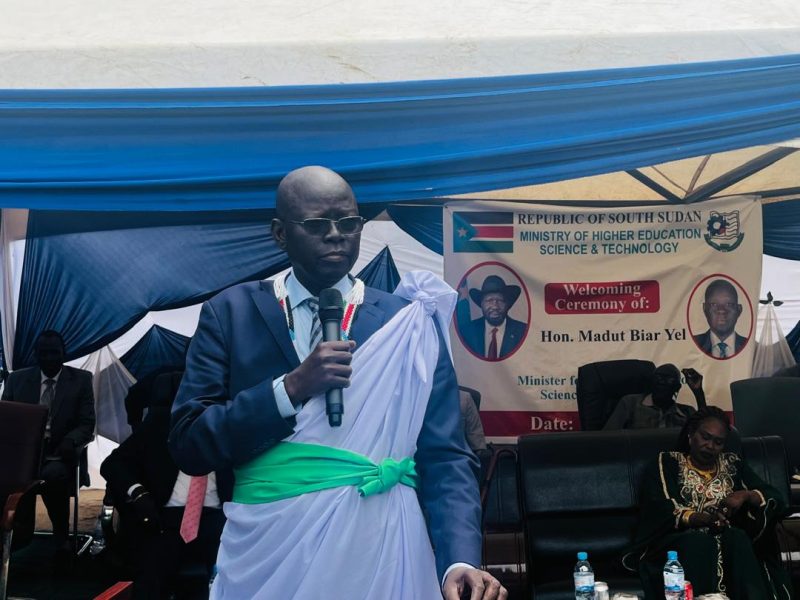
By Denilson Deneki
South Sudan’s newly appointed Minister of Higher Education, Science, and Technology, Madut Biar Yel, has vowed to turn vision into action, pledging comprehensive reforms to elevate universities and enhance the quality of education nationwide.
At his official welcome and handover ceremony, Biar thanked President Salva Kiir Mayardit for entrusting him with this crucial role, promising to introduce fresh ideas and transformative leadership to strengthen the country’s higher education system.
“I am honored by this opportunity,” Biar said. “Having devoted much of my life to serving South Sudan, I step into this role with humility and a firm commitment to delivering meaningful change.”
Recognizing the contributions of his predecessor, Gabriel Changson Chang, Biar praised his efforts in advancing educational institutions, acknowledging the groundwork laid before him.
“His contributions have been significant, and I commend him for his dedication. I wish him success in his future endeavors,” he stated.
As South Sudan strives to strengthen its higher education sector, Biar highlighted the power of collaboration in driving progress, underscoring the importance of working closely with ministries, educators, and development partners to create sustainable solutions.
“Education is the foundation of national development. We must unite our efforts to build a stronger, more innovative system that empowers our youth,” he emphasized.
With a background in policymaking, Biar recalled his instrumental role in drafting the Labor Act while leading the parliamentary committee on Labor, Public Service, and Human Resource Development.
He reaffirmed his commitment to progressive policies that support South Sudan’s workforce and future generations.
A key priority for Biar’s tenure is boosting private sector involvement in technical and vocational education. He stressed that education must be adaptive, forward-thinking, and aligned with the needs of a rapidly evolving job market.
“Investing in research, innovation, and technical education is vital,” he said. “Our universities must produce graduates equipped with practical skills, ready to meet the demands of the modern economy.”
Speaking at the same function, James Hoth Mai, Minister of Labor, encouraged patience and resilience in governance, expressing confidence in the minister’s ability to transform the education sector while acknowledging bureaucratic hurdles that can slow progress.
“I trust that you will carry forward the vision,” he said. “Delays happen, but they should never deter us from our mission. We must remain steadfast in our commitment to change.”
Both ministers emphasized the need for inter-ministerial cooperation in advancing national development goals, particularly in education, labor, and youth empowerment.

